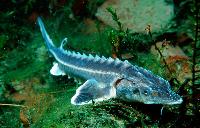Danube Day 2013: WWF gets active for the sturgeons and more

Copyright © naturepl.com / Frei / ARCO / WWF-Canon
Get active for the sturgeons is the slogan of this year's Danube Day, celebrated by the 14 Danube basin countries on Saturday, 29 June.
Under a new EU-funded project, which will go on until September 2015, WWF in Romania and Bulgaria are working to tackle overfishing, the main direct threat to the survival of the endangered Danube sturgeons.
“The project works with fishing communities – most affected by the fishing ban but yet rather neglected – and supports the efforts of enforcement authorities”, WWF sturgeon expert Jutta Jahrl said.
Additionally, in Bulgaria, a three-year project funded by the EU’s Environment Operational Programme aims to identify and protect key sturgeon spawning sites in the Bulgarian part of the Danube, as these crucial habitats are still largely unknown and under threat of destruction by water engineering or gravel extraction. The project will also facilitate the release of 50,000 young sturgeons, bred from genetically pure Danube stocks, to support wild populations.
In the spring a first expedition survey to find sturgeons’ spawning sites in Bulgaria took place. “As very little is known, it is crucial that more detailed information is gathered where these sites are”, WWF freshwater expert in Bulgaria Stoyan Mihov explained.
Some of WWF’s achievements in the Danube basin in the past 12 months:
- Three new transboundary wetland complexes along the Danube River prepared by WWF were approved by the Secretariat of the Ramsar Convention on the Conservation of Wetlands. The designation of Lake Calarasi – Srebarna, Suhaia - Belene Islands Complex and Bistret - Ibisha Island will allow for the full protection of the bird colonies that nest and feed in Bulgaria and Romania.
- A major wetland restoration project in the Mura-Drava-Danube area was implemented on two sites, Kopacki Rit Nature Park in Croatia and Gornje Podunavlje Special Nature Reserve in Serbia. Both sites are part of the vast Central Danube Floodplain that presents one of the most prolific wetland area in the middle course of the Danube.
- At a high-level meeting of the International Commission for the Protection of the Danube River representatives of Danube basin countries, including Austria, Bulgaria, Hungary, Romania, Serbia and the Ukraine, adopted guidelines for reducing the ecological damage of new hydropower projects. WWF and other NGOs had to fight hard over the past two years to make these guidelines acceptable.
- The fifth Danube expedition checked out the bird colonies in the Bulgarian and Romanian stretch of the river. The results will be announced soon. The transboundary conservation project on the pygmy cormorant and the ferruginous duck colonies in key Romanian and Bulgarian sites on the Danube continued.
- The research for the soon-to-start restoration project in Mahmudia in the Danube Delta in Romania is on its way. The restoration of rare yellow water lilies in the marshes of Persina Nature Park in the Bulgarian stretch of the Lower Danube has already been started. The near-by Kaikusha lake was restored.
- Key stakeholders in the Danube Delta region have agreed to tackle potential consequences of climate change by signing last March in Izmail, Ukraine, a joint statement on climate proofing the Danube Delta (Moldova, Romania, Ukraine). The informational campaign "We want to live in a healthy region!" was launched also in March in 40 schools and ecoclubs of the region to educate teachers and pupils in the Danube Delta about climate change, biodiversity of the region, ecological and water footprint and different nature protection issues.
Danube Day 2013 events organized by WWF and partners:
In Serbia WWF is joining the main Danube Day celebration organized in Belgrade with a quiz for primary school kids about the Danube and the Danube sturgeons and a series of water experiments. WWF will also participate in the Danube music festival ‘Regeneracija Dunava’ in Backi Monoštor with the “Water labyrinth” photo exhibition related to the promotion of the future UNESCO Mura-Drava-Danube Biosphere Reserve.
In Blahnita (Mehedinti), Romania, a Danube Week has already been organized, involving local authorities, leaders and kids promoting WWF’s work in the area. Also in Romania, WWF joined this week three major NGO’s working on the Danube Delta and launched a ‘Call for a Living Danube Delta’, during a conference hosted in Tulcea and gathering high representatives of the national authorities. The call, submitted to the authorities, proposes a series of principles of sustainable development of the area, with benefits for nature, people and economy.





